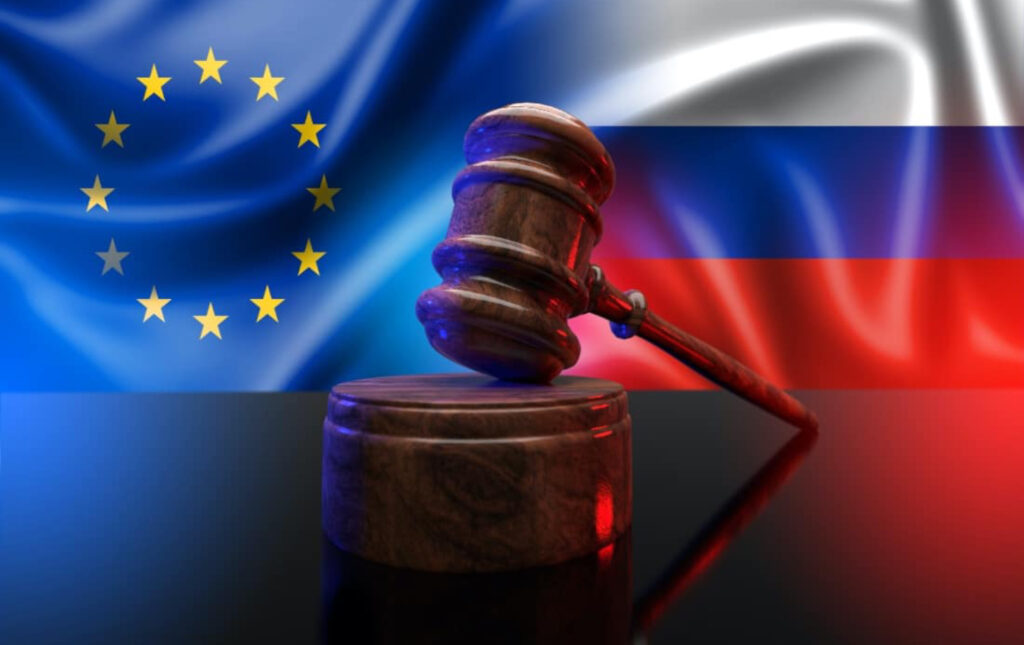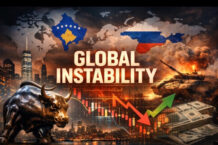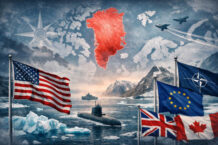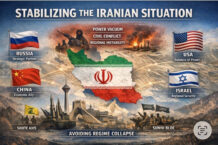
Geopolitica
Varato 18° pacchetto di sanzioni a Mosca: Putin ringrazia!
Dopo ben 17 analoghi pacchetti complessivamente fallimentari, ecco varato forse il peggiore sin qui adottato. (Bilingual text)
Intesa EU sul 18° pacchetto di sanzioni a Mosca. Kallas: “Colpito bilancio bellico del Cremlino”: nuove misure contro la Russia in ambito energetico, finanziario e commerciale”. Ma siamo proprio sicuri che sia tutto così semplice dopo 17 pacchetti fallimentari?
Stando a quanto si è appreso in queste ore l’Unione Europea avrebbe appena approvato quello che l’Alta Rappresentante per la Politica Estera dell’Unione Europea, Kaja Kallas, in un messaggio su X ha definito “uno dei suoi pacchetti di sanzioni più severi contro la Russia”: un pacchetto che dopo l’ok del Comitato Permanente dei Rappresentanti degli Stati Membri presso la EU (COREPER), attendeva solo l’adozione formale da parte dei Ministri degli Affari Europei al Consiglio Affari Generali della EU.
Il pacchetto, che nello specifico prevede diverse misure ritenute significative, vede quale suo punto di forza la modifica del meccanismo del tetto al prezzo del petrolio russo trasportato verso Paesi terzi, deciso in sede G7 e dall’enforcement complicato, che finora Mosca è riuscita in parte a eludere.
In altre parole è stato introdotto un meccanismo dinamico di tetto al prezzo del greggio russo, che fisserà –ma meglio faremmo a dire che dovrebbe fissare– il prezzo al quale potrà essere venduto (non nella EU), con uno sconto del 15% rispetto al prezzo medio di mercato del petrolio russo. L’Urals è il benchmark russo, e viene di solito scambiato a sconto rispetto al Brent, il greggio di riferimento europeo.
Ai prezzi attuali ciò significa che, ove applicato, il meccanismo farebbe passare il prezzo di vendita da circa 60 USD al barile a circa 47,6 USD al barile. La mossa, in linea di principio interessante, presenta tuttavia una falla in quanto la sua definizione è stata adottata avendo cura di non sconvolgere i mercati globali interrompendo completamente le forniture russe che, comunque la si voglia mettere, rappresentano una fetta significativa del mercato globale.
Ora la più prevedibile delle contromosse russe, un taglio della produzione, potrebbe far lievitare i prezzi a livello mondiale per effetto di una risalita di quelli di Brent e WTI, e contrarre il volume delle vendite, ma non è affatto detto che questo equivalga ad una contrazione delle entrate totali di Mosca dato che l’esito finale dipende dall’equilibrio tra prezzo e quantità venduta, come pure dalla effettiva chiusura delle vie di fuga (shadow fleet), altro aspetto rientrante nel pacchetto.
In questo contesto la soglia dei 47,6 USD al barile è tale da far si che l’effetto sanzioni sia tanto più debole quanto più il prezzo sopravanza la soglia, anche se va detto che la Russia potrebbe vendere comunque a prezzi bassi e guadagnare quanto prima vendendo più barili, ovvero aumentare i ricavi unitari vendendo meno barili.
Certo è che se è vero che, in linea di principio, la riduzione della produzione moscovita potrebbe essere una buona contromossa di Mosca, ma che é altrettanto vero che a questo taglio farebbe da contraltare una riduzione del quantitativo di greggio disponibile per essere piazzato clandestinamente tramite la flotta ombra, limitando nel contempo l’opportunità di Mosca di spacchettare i prezzi più alti in mercati terzi, resta che nessuno sembra aver preso in considerazione l’effetto combinato sullo stato di salute dell’Europa della applicazione dei dazi statunitensi alla EU e della risalita globale del prezzo del greggio importabile dalla stessa EU.
Una considerazione, questa, che purtroppo non pare sia stata fatta in ambito comunitario, ma che sarebbe stato doveroso fare essendo che quella ucraina è palesemente una guerra di logoramento.
Nello specifico l’effetto combinato macroeconomico può essere facilmente esplicitato considerando che sicuramente dal mix conseguirebbe:
- un effetto di tipo inflattivo energetico (aumento dei prezzi di gas, Diesel ed elettricità) che finirebbe per penalizzare aziende e consumatori;
- un aumento della pressione sui profitti industriali, in particolare nel caso dei settori Diversi modelli, poi, permettono di stimare la riduzione del PIL EU di circa lo 0,3 punti percentuali, con una curva recessiva possibile nel caso di una rapida risalita dei costi energetici. In particolare, nel caso di dazi al 30%, una stima prudenziale fa intravedere l’inizio di una possibile fase recessiva nella zona Euro nella seconda metà del 2025.
Tanto per non parlare del fatto che dazi e shock inflazionistici deprimendo le quotazioni dello USD avrebbero un effetto negativo sulle esportazioni.
Ora, se con riferimento a quest’ultimo punto facciamo mente locale che le solite politiche di risposta per la EU vedono giocare un ruolo fondamentale quelle di diversificazioni delle fonti di approvvigionamento, e che ciò dovrebbe avvenire nel momento stesso in cui siamo in presenza di una vera e propria apertura del Fronte Sud[1], quello mediterraneo, nel contesto del confronto con Mosca, direi che il pacchetto in esame rischia di tradursi nel peggiore possibile autogol del momento da parte della EU.
Un autogol per la EU ed un potenziale disastro strategico per l’Ucraina che vede Putin poter disporre, proprio ora grazie alla introduzione del 18° pacchetto, di un ampio l’asso di tempo in cui i ‘volenterosi’ della EU potranno procrastinare qualsiasi decisione quanto ad un ulteriore intervento al dopo verifica dell’effetto sanzioni, e gli Stati Uniti prendere tempo per perfezionare il passaggio di mano del problema Kyiv alla EU.
Una nota di colore che rende ulteriormente conto del livello di degrado politico dell’Unione Europea ci giunge dalla seguente notizia, sempre con riferimento al famigerato pacchetto.
“Viene imposto, come aveva preannunciato pubblicamente il presidente francese Emmanuel Macron, un divieto di importazione nella EU di prodotti raffinati derivati da petrolio russo provenienti da Paesi non EU, ma con alcune significative eccezioni quali la Norvegia, il Regno Unito, gli Stati Uniti d’America, il Canada e la Svizzera”.
L’aspetto tragicomico risiede nel fatto che questo provvedimento sarebbe stato salutato come foriero della chiusura di una falla che consentiva a Mosca di continuare ad esportare indirettamente greggio, a scopi di raffinazione.
Stando così le cose non è dato capire di cosa si sia dichiarato contento Zelenskyy in questo frangente che dovrebbe consigliargli di ritornare quanto prima al tavolo delle trattative, finalmente consapevole della lungimiranza di colui che articolò il ben noto proverbiò che testualmente recita:
“Dai nemici mi guardo io, dagli amici mi guardi Iddio!”
—————————————————————————
18TH MOSCOW SANCTIONS PACKAGE ENACTED: PUTIN THANKS!
EU agreement on 18th sanctions package on Moscow. Kallas: “Kremlin’s war budget hit: new measures against Russia on energy, finance and trade.” But are we really sure it’s all that simple after 17 failed packages?
According to reports in recent hours, the European Union has just approved what the EU’s High Representative for Foreign Policy, Kaja Kallas, in a message on X called “one of its toughest sanctions packages against Russia”-a package that, after being okayed by the Standing Committee of Representatives of the Member States to the EU (COREPER), was only awaiting formal adoption by the Ministers of European Affairs at the EU General Affairs Council.
The package, which specifically includes several measures considered significant, sees as its strong point the modification of the mechanism of the ceiling on the price of Russian oil transported to third countries, decided in the G7 and with complicated enforcement, which Moscow has so far partly managed to circumvent.
In other words, a dynamic ceiling mechanism has been introduced on the price of Russian crude oil, which will set -but we would better say should set- the price at which it can be sold (not in the EU), at a 15 percent discount to the average market price of Russian oil. Urals is the Russian benchmark, and is usually traded at a discount to Brent, the European benchmark crude.
At current prices, this means that, if applied, the mechanism would cause the selling price to rise from about US$60 per barrel to about US$47.6 per barrel. However, the move, interesting in principle, has a flaw in that its definition was adopted taking care not to disrupt global markets by completely disrupting Russian supplies, which, however you want to put it,represent a significant slice of the global market.
Now the most predictable of Russian countermoves, a cut in production, could raise global prices as a result of a rise in those of Brent and WTI, and contract the volume of sales, but it is by no means certain that this equates to a contraction in Moscow’s total revenue since the final outcome depends on the balance between price and quantity sold, as well as on the effective closure of escape routes (shadow fleet), another aspect included in the package.
In this context, the threshold of $47.6 per barrel is such that the sanctions effect is all the weaker the more the price crosses the threshold, although it must be said that Russia could still sell at low prices and make as much profit as before by selling more barrels, i.e., increase unit revenues by selling fewer barrels.
Of course, while it is true that, in principle, reducing Moscow’s production could be a good countermove by Moscow, it is equally true that this cut would be counterbalanced by a reduction in the amount of crude available to be clandestinely placed through the shadow fleet, while at the same time limiting Moscow’s opportunity to unpack higher prices in third markets, it remains that no one seems to have considered the combined effect on Europe’s health of the application of U.S. tariffs to the EU and the global rise in the price of crude that can be imported from the EU itself.
A consideration, this one, that unfortunately does not seem to have been made in the EU, but one that should have been made being that the Ukrainian one is clearly a war of attrition.
Specifically, the macroeconomic combined effect can easily be made explicit considering that surely from the mix would result:
- an energy-inflationary effect (increase in gas, Diesel and electricity prices) that would end up penalizing companies and consumers;
- an increased pressure on industrial profits, particularly in the case of energy-intensive sectors. Several models, then, allow estimating the reduction of EU GDP by about 0.3 percentage points, with a recessionary curve possible in the case of a rapid rise in energy costs. In particular, in the case of 30 percent duties, a conservative estimate hints at the beginning of a possible recessionary phase in the Eurozone in the second half of 2025.
Not to mention that duties and inflationary shocks depressing USD quotations would have a negative effect on exports.
Now, if with reference to this last point let us keep in mind that the usual response policies for the EU see those of diversification of sources of supply playing a key role, and that this should take place at the very moment when we are in the presence of a real opening of the Southern Front, the Mediterranean one, in the context of the confrontation with Moscow, I would say that the package under consideration risks to result in the worst possible own goal of the moment on the part of the EU.
An own goal for the EU and a potential strategic disaster for Ukraine, which sees Putin being able to have, just now thanks to the introduction of the 18th package, a large l’ace of time in which the ‘willing’ in the EU will be able to procrastinate any decision as to further intervention until after verification of the sanctions effect, and the U.S. taking time to perfect the handover of the Kyiv problem to the EU.
A colorful note further accounting for the EU’s level of political degradation comes to us from the following news, again with reference to the infamous package;
“A ban is imposed, as French President Emmanuel Macron had publicly announced, on the import into the EU of refined products derived from Russian oil from non-EU countries, but with some significant exceptions such as Norway, the United Kingdom, the United States of America, Canada and Switzerland.”
The tragicomic aspect lies in the fact that this measure would be hailed as a harbinger of closing a loophole that allowed Moscow to continue to export crude oil indirectly, for refining purposes.
This being the case, it is hard to understand what Zelenskyy declared himself happy about at this juncture that should advise him to return to the negotiating table as soon as possible, finally aware of the foresight of the man who articulated the well-known proverb that verbatim reads:
“From enemies I guard, from friends God guard me!”
[1] https://www.ofcs.it/internazionale/il-fronte-meridionale-non-e-una-scoperta/#gsc.tab=0





Devi fare login per commentare
Accedi